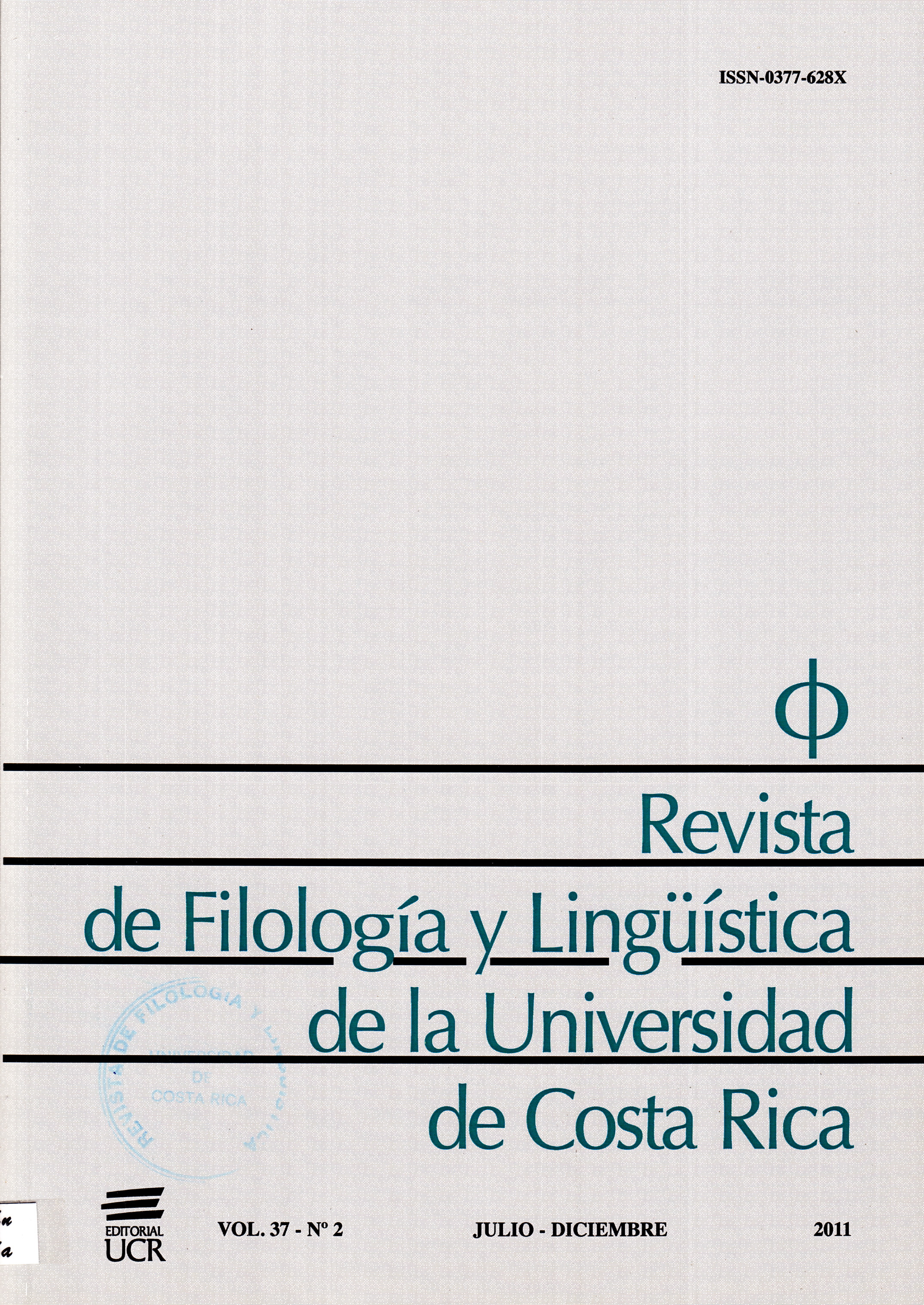Abstract
History has shown that whenever there is a situation of languages in contact, it develops either into a harmonious bilingualism or an overpowering colonialism. It is also well known that the relationship between language and identity may bring about divergent consequences in such circumstances; notably, cultural assimilation or the fusion or the extinction of a language. This paper will focus on the case of a minority of English-based Limonese Creole (LC) speakers in contact with Spanish-speaking (S) Costa Ricans. It will be apparent that LC speakers frequently make use of LC-S code-switching and imported loans and substitutions thus incorporating Spanish into Limonese Creole. Even though it is risky to predict the future of that relationship, this fusion –rather than the extinction of the Creole– may prevail if its speakers consider their language an important element of their identity.References
Arends, Jacques; Pieter Muysken y Smith Norval (Eds.). 1995. Pidgins and Creoles: an Introduction. Amsterdam: John Benjamins Publishing Company.
Bozzoli, María Eugenia. 1995-1996. “La población costarricense: diversidad, tolerancia y discriminación”. Revista Herencia. 7-8 (1-2): 131-148.
Chamoreau, Claudine y Yolanda Lastra (Eds.). 2005. Dinámica lingüística de las lenguas en contacto. Hermosillo: Universidad de Sonora.
Dorian, Nancy (Ed.). 1989. Investigating Obsolescence. Studies in Language Contraction and Death. Cambridge: Cambridge University Press.
Finegan, Edward y John Rickford (Eds.). 2004. Language in the U.S.A.: Themes for the Twenty-first Century. Cambridge: Cambridge University Press.
Fishman, Joshua. 1972. Language and Nationalism. Massachusetts: Newbury House.
Foley, William. 1998. Anthropological Linguistics: An Introduction. Massachusetts: Blackwell.
Giles, Howard (Ed.). 1977. Language, Ethnicity and Intergroup Relations. London: Academic Press.
Giles, Howard; Richard Bourhis y Donald Taylor. 1977. “Towards a Theory of Language in Ethnic Group Relations”. En: Giles (Ed.), 307-344.
Gumperz, John. 1982. “Conversational code-switching”. Discourse Strategies. Cambridge: Cambridge University Press.
Haugen, Einar. 1956. Bilingualism in the Americas: A Bibliography and Research Guide. Alabama: University of Alabama Press.
Herzfeld, Anita. 2002. /mekaytelyuw/: la lengua criolla (de Costa Rica). San José: Editorial de la Universidad de Costa Rica.
(2005). “Mecanismos de cambios lingüísticos inducidos por contacto”. En: Chamoreau y Lastra (Eds.), 333-355.
Holm, John (Ed.). 1983. Central American English. Heidelberg: Groos.
Jacobson, Rodolfo (Ed.). 1998. Trends in Linguistics. Studies and Monographs 106. Codeswitching Worldwide. Berlin: Mouton de Gruyter.
Kindell, Gloria y M. Paul Lewis (Eds.). 2000. Assessing Ethnolinguisitc Vitality: Theory and Practice. Dallas: SIL International.
Miller, Carolyn. 2000. “Modifying Language Beliefs: a Role for Mother-Tongue Advocates?”. En: Kindell y Lewis (Eds.), 167-187.
Myers- Scotton, Carol. 1993a. Social motivation for code-switching: evidence from Africa. Oxford: Clarendon Press.
(1993b). Dueling languages: Grammatical structure and code-switching. Oxford: Oxford University Press.
Muysken, Pieter. 2000. Bilingual Speech: A Typology of Code-Mixing. Cambridge: Cambridge University Press.
Rindler, Rosita. 1998. “Code-switching as an indicator for language shift? Evidence from Sardinian-Italian bilingualism”. En: Jacobson (Ed.), 221-248.
Smith, Norval. 1995. “An annotated list of creoles, pidgins, and mixed languages”. En: Arends, Muysken y Smith (Eds.), 331-374.
Spence, Marva. 1993. A Case Study of Language Shift in Progress in Port Limon, Costa Rica. Ph. D. dissertation: Georgetown University.
Thomason, Sara. 2001. Language Contact: an Introduction. Washington, D.C.: Georgetown University Press.
Weinreich, Uriel. 1953. Languages in Contact: Findings and Problems. New York: Linguistic Circle of New York.
Yamamoto, Akira y Ofelia Zepeda. 2004. “Native American Languages”. En: Finegan y J. Rickford (Eds.), 153-181.

